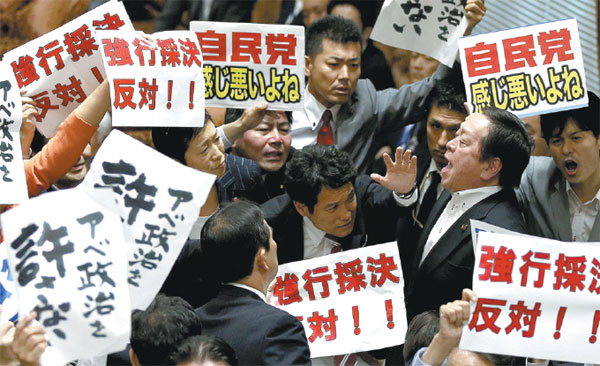Security bills signal offensive change
Updated: 2015-07-17 08:41
(China Daily)
|
|||||||||||
 |
|
Yasukazu Hamada (second from right), chairman of the lower house committee that approved the bills, is surrounded by opposition lawmakers after the vote. If the bills become law, Japanese troops will be able to fight abroad. Toruhanai / Reuters |
With Japan's lower house of parliament giving the green light to two controversial security bills on Thursday, Japanese Prime Minister Shinzo Abe is one step closer to his ambition of reversing the nation's self-imposed ban on exercising the right to collective self-defense and militarizing its Self-Defense Forces.
Under the security bills, which are still subject to approval by Japan's upper house of parliament, Japan would be able to send its troops abroad for the first time since World War II, and its Self-Defense Forces could fight "under certain conditions" even if Japan itself is not attacked.
Hence, it is crystal clear that if passed the security bills would signal a change in Japan's defense policy from "defensive" to "offensive".
Against the backdrop that Japan has not yet fully owned up to its militarist past and Abe is leading the country with ultra-right ideologies, the world has good reason to question the Japanese leader's real intention in forcing through the security bills.
Yet the security bills are just one of the many schemes Abe is employing to break the limitations imposed by Japan's pacifist Constitution. Since he took office in 2012, Abe has been trying to legitimize Japan's "remilitarization" as an important step toward giving his country a greater international profile.
What Abe has been maneuvering in Japan's political field poses a serious threat to the post-war international order. For the lesson of the war to be truly learned, the world should remain alert to this ill-tendency in Japan and do more to push the country back onto the right track again.
Abe's ambition to cultivate a more "aggressive" Japan has also invoked deep concerns among its neighbors, China and South Korea included, and will only undermine efforts to repair ties.
Abe should also be reminded that his security bills are unpopular among his own countrymen. The majority of Japanese do not want to see Japan being dragged into conflicts around the globe, which means a growing defense budget and more pressure on the Japanese economy.
This year marks the 70th anniversary of the victory in the war against fascism, and the whole world is hoping Japan will show real repentance for its militarist past and contribute more to regional peace and stability.
For the island country to become a respected international and regional player, Abe really should not walk on the wrong road any further.
Related Stories
China voices stern concern over Japan's security bills 2015-07-16 21:21
China expresses concern after Japan's passage of security bills 2015-07-16 15:50
Shinzo Abe slashes 7 decades of pacifism, switches Japan to war mode 2015-07-16 15:48
Japan's ruling bloc rams through controversial war bills in lower house 2015-07-16 13:56
Today's Top News
ECB raises Greek bank funding as Europe backs new loan
Greek parliament approves debt deal and reforms
British boy with eczema wins support from Chinese Internet users
Internet giants reprimanded over obscene clip
First-tier cities have less appeal to graduates
Chinese cult leader faces criminal prosecution
Former Auschwitz bookkeeper, 94, sentenced to four years in prison
China posts 7% GDP growth rate in Q2
Hot Topics
Lunar probe , China growth forecasts, Emission rules get tougher, China seen through 'colored lens', International board,
Editor's Picks

|

|

|

|

|

|






